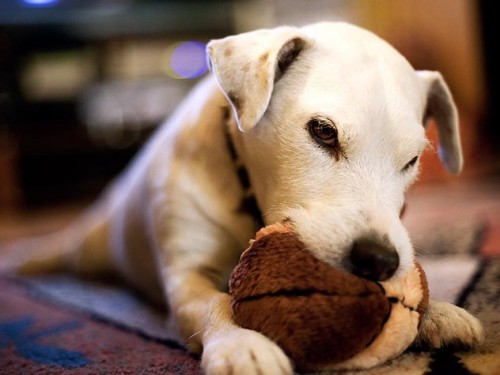How Do I Stop My Dog From Chewing?
The following is an excerpt from Petfinder’s FurKeeps Kickoff Ask the Experts Forum.
Q: Unlike my Lab, who carries around her rawhide bones for days, weeks even, my parents’ female Lab chews them up in a few minutes.
How do we stop my parents’ dog’s aggressive chewing? She is overweight, so it’s not hunger. They live on a farm and she goes everywhere in the car with my retired parents.
A: I wish there was a solid great answer for your question. The bottom line is, every dog is different. Some are serious chewers and some are hobby chewers! It sounds like your dog is more of a hobby chewer and your parents’ dog is really dedicated to the task!

Regular rawhide tends to go very fast with a dedicated chewer so some suggestions for your parents’ dog would be to try some of the more indestructible toys like Kongs and Busy Buddy toys from Premier.
These toys are very hardy and are also interactive, so your parents’ dog will have to use her mind as well as her mouth to get through them. All of them can be stuffed with food to some degree and your imagination is the only thing that limits what you put into a well-stuffed Kong! Leftovers never go bad in my house as they get stuffed into a Kong and more often than not frozen to make the challenge that much tougher for my dogs.
Stuff the toys easily at first and then make it harder as the dog gets better at unstuffing them!
The other bones I like are the huge bronto bones — they are essentially cow femurs and are available in most feed stores and some better pet supply places. They look like a dinosaur bone really. They’re huge! If you hand her that outdoors or on a dog bed it should take her a while to make a dent in that. Of course, she should not eat the whole bone in one sitting. This would be a few days or a week of entertainment in my house, even with the power chewers sitting below my desk!
Bronto bones are generally hickory smoked so they have a coating that comes off. Be sure to avoid white carpets or nice dog beds until they lick and chew off all the good stuff.
My short-version advice?
The bigger the better with power chewers.
If she cannot get her whole mouth on the bone or toy to get a good chomp down that will help. The power comes from the back of the jaw so if she has to work at it at the front of her mouth, rather than being able to get it entirely inside, it may last longer.
If you stick with regular rawhide, look for big, industrial size ones — no smaller than 12″ in length. Pressed rawhide or something with multiple layers of rawhide rolled into a retriever roll is ideal.
If she consumes a lot, be sure to buy USA-made rawhides, as some of the other countries still use chemicals that are not ideal to consume in larger quantities!
Vitamins and Minerals for Dogs

Biotin: Aids in enzymatic processes
Choline: Helps maintain the nervous system
Folic acid: Works with vitamin B12 and helps form red blood cells.
Vitamin A: Helps maintain vision, bone growth, tissue and reproductive processes
Vitamin B1 (thiamine): Aids in normal growth, appetite and energy production
Vitamin B2 (riboflavin): Aids in growth
Vitamin B5 (pantothenic acid): Helps produce energy and metabolize protein
Vitamin B6 (pyridoxine): Helps metabolize protein and form red blood cells
Vitamin B12: Helps synthesize DNA and aids intestinal function
Vitamin C: Helps form tissue, heal skin and maintain bones and teeth; may help support healthy joint function as well as immune function
Vitamin D: Helps use calcium and phosphorous to maintain bone and cartilage
Vitamin E: Important for muscle function and normal reproduction; protects muscle cells from damage due to oxidation in the body
Vitamin K: Facilitates proper blood clotting
Dogs also require some of the same minerals humans require. The following are the most important of these minerals:
Calcium
Magnesium
Phosphorous
Sulfur
Calcium and phosphorous work together to strengthen bone. Magnesium helps with cell action and nutrient metabolism. Sulfur helps the body synthesize protein and protects joints.
Dogs don’t just need these minerals, but in the correct amounts. For example, insufficient calcium can result in muscle, nerve, bone and blood problems, but excessive calcium can cause bones to grow too quickly and lead to future orthopedic disorders such as hip dysplasia.
Dogs also need trace minerals, such as:
Iron
Zinc
Copper
Cobalt
Selenium
Manganese
Iodine
Cobalt
Mineral requirements differ slightly for different dog breeds. Check with your veterinarian to be sure the food you have chosen has the correct nutritional profile for your individual dog.





